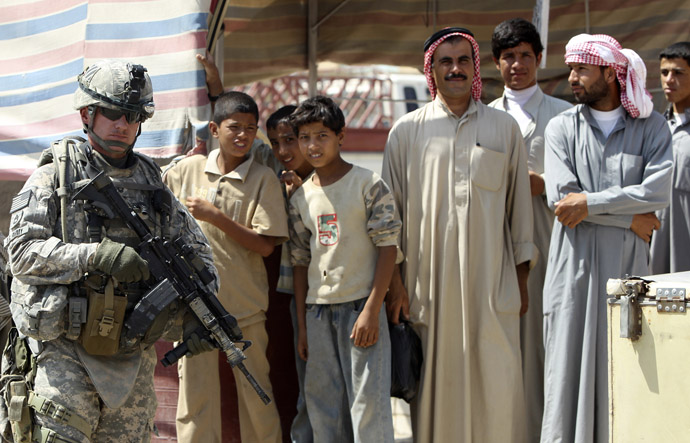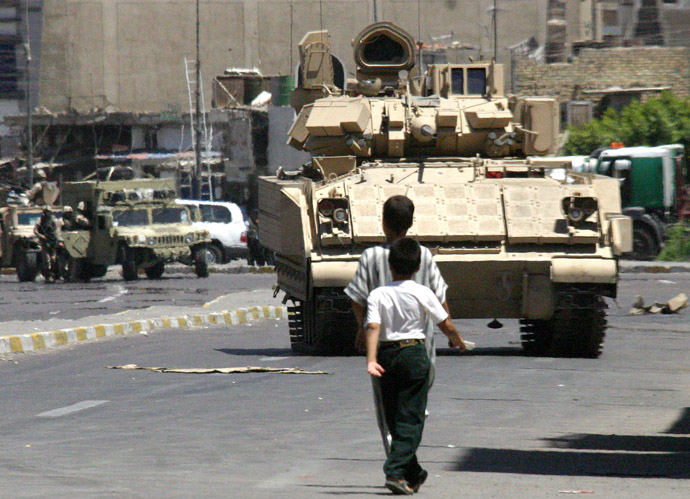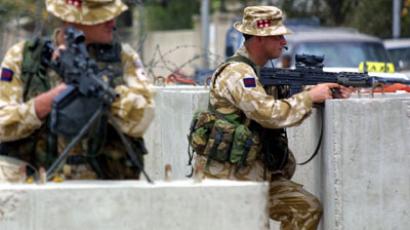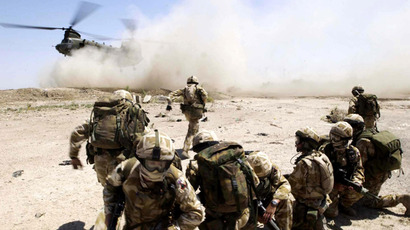'United States of Amnesia': No accountability for ‘grievous errors’ in Iraq
Ten years after the US invasion of Iraq, the humanitarian situation in the country is bleak. Critics say the hugely unpopular occupation of Iraq, and the lack of accountability for the officials responsible, has irreparably damaged America’s image.
On March 20, 2003, the United States – in defiance of the United
Nations, which had weapons inspectors on the ground in Iraq –
opened a military offensive against the Arab Republic on the
premise that the Baathist government of Saddam Hussein was
harboring weapons of mass destruction.
One decade later, the global community is aware that the
intelligence claims of Iraqi WMDs were patently false at least –
and a blatant fabrication at worst – but this knowledge has done
nothing to erase the damage of the conflict.
The exact number of Iraqi civilians who lost their lives during
the war varies considerably, depending on the source. The Iraq Body
Count project (IBC), for example, puts the number between 110,937
and 121,227. But the Opinion Research Business (ORB), an
independent polling agency based in London, has calculated the
number of fatalities at over 1 million.
For the survivors, each of whom seems to know somebody who was killed or injured in the conflict, the physical aftermath of eight years of war and insurgency is visible everywhere.
In Fallujah, previously the site of fierce fighting between
Iraqi resistance fighters and US forces, more than half of all
babies conceived after the start of the war were born with heart
defects, and the area has a disturbingly high infant mortality
rate.
A World Health Organization (WHO) study published last year
connected the grave situation with the effect of toxic substances
prevalent in many conventional weapons. Hair samples taken from the
civilian population of Fallujah showed levels of lead in children
with birth defects five times higher than elsewhere; mercury levels
were recorded at six times higher.

Much of the country’s infrastructure remains in shambles as
well. Critics point to corruption and the mismanagement of
reconstruction funds: Of the $60 billion that Washington supposedly
spent on reconstruction, much of that amount was
squandered.
“President George W. Bush asked for $20 billion dollars for reconstruction, but Paul Wolfowitz and Donald Rumsfeld said ‘$20 billion may be too much because of Iraqi oil, Iraq will be able to pay for reconstruction itself,” John Gannon, former deputy director for intelligence at the CIA, commented at the Center for National Policy, a Washington think tank.
This broken promise is yet another debt to the Iraqi people that remains unpaid, Gannon added.
At the same time, the American people – who lost 4,488 military personnel and 3,400 security contractors in the conflict – are also suffering 10 years later, although in much less perceptible ways. One recent study put the price of the war at $2 trillion dollars, with a price tag that could eventually reach $6 trillion over the next four decades.

‘The end of America’s unipolar moment’
The consequences of the war in Iraq go beyond loss of life and physical destruction. Scott Bates, President of Center for National Policy, a Washington think tank, said there is a geopolitical price to pay for the decision to invade Iraq.
Pointing to the “law of unintended consequences,” Bates said that US credibility and influence were tarnished following the attack on Iraq, while Iran’s clout has increased. America is still living with the consequences of this, 10 years later: “Our unipolar moment ended when we went into Baghdad, but we didn’t know it,” Bates said.
Colonel Lawrence Wilkerson, who served as chief of staff to Secretary of State Colin Powell at the time of the invasion, said that Iraq has changed the way the world sees the US. “Our rhetoric is high and lofty and we talk about human rights and human dignity and freedom and democracy, and then what do we do? We mount a war of aggression on Iraq, kill a couple hundred thousand people, and mess it up majorly, including the region,” Wilkerson told RT in an interview.
Wilkerson explained that when such incidents occur, “the
world stands up and begins to balance the hegemon.”
When asked if the individuals who made the decision to invade Iraq, despite widespread global protest, should be held responsible, Wilkerson said that “history will hold them responsible,” emphasizing that there is “no accountability for people who make grievous errors in high office in the United States.”

He then quoted the title of a book by American author Gore Vidal, saying: “We’re the United States of amnesia!"
Washington’s tendency to forget its past mistakes could prove disastrous, with new war talk brewing on Capitol Hill. Former CIA intelligence officer Gannon warned that the US intelligence community was experiencing something he called the “politicization of intelligence,” which, he argues, has been hampering US foreign policy since at least the Vietnam War.
“Whenever you have a situation where you have a forced mindset, as you did in the early 2002 to 2003 period [in the run up to war in Iraq], or as you did in the Lyndon Johnson administration in the early years of Vietnam, or with Iran in 1979… when we weren’t allowed to deal with the opposition, you create an environment for ‘politicization of intelligence,’” Gannon warned.
The retired CIA officer concluded by saying that Washington
currently holds similar attitudes towards the Middle East.














